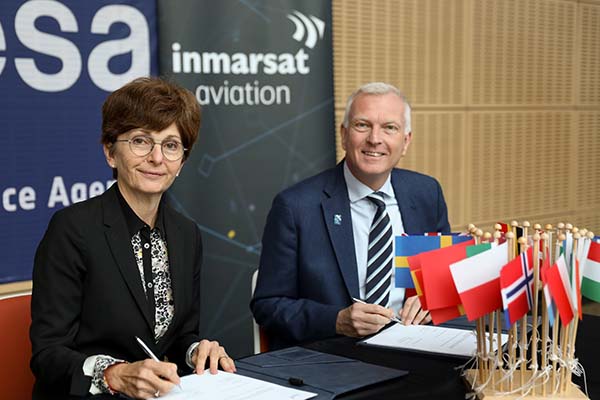 Inmarsat has signed a contract with the European Space Agency (ESA) for phase two of its Iris air traffic modernisation programme, which will include important flight trials across Europe to assess the service in a real operational environment.
Inmarsat has signed a contract with the European Space Agency (ESA) for phase two of its Iris air traffic modernisation programme, which will include important flight trials across Europe to assess the service in a real operational environment.
Iris is being developed to deliver powerful benefits to European aviation by enabling high bandwidth, cost-effective satellite-based datalink communications over Europe. The programme contributes to the delivery of the ‘Single European Sky’, which focuses on modernising air traffic management and air navigation efficiency. Satellite communications reduces the pressure on ground-based frequencies, which third party reports have indicated will be under significant capacity stress in the next 5-10 years.
As part of the programme’s second phase, flight trials will be conducted on approximately 20 aircraft flying commercially over a six-month period starting in 2020, allowing Iris to be assessed in a real operational environment. Selected airlines will take part in the demonstration, with the support of leading Air Navigation Service Providers (ANSPs), to evaluate the Iris programme for air traffic control (ATC) and airline operational communications (AOC) across continental Europe.
Also in this phase, Inmarsat will work with ESA to prepare for pan-European certification of the Iris service provider and define a distribution agreement. In addition, Inmarsat and its partners, such as Thales Alenia Space, will prepare for future air traffic control requirements through research & development and prototyping. This will include transitioning to the Aeronautical Telecommunications Network/Internet Protocol Suite (ATN/IPS) standard, which will make the service truly global.
John Broughton, Senior Vice President of Aircraft Operations and Safety Services at Inmarsat, said: “We are very excited to embark on the next phase of Iris with all of our partners. Important progress has already been made on various critical elements and as a result of strong industry-wide interest, several important agreements have been signed with major European ANSPs, aircraft manufacturers and airlines. Today’s agreement brings us another step closer to delivering the Iris programme.”
Magali Vaissiere, Director of Telecommunications and Integrated Applications at ESA, added: “Flying this technology for six months on some 20 aircraft brings years of research and preparation closer to fruition. We are a step closer to making real the highly anticipated idea of a modern air traffic management system over Europe. We look forward to seeing the results of the commercial flight demonstrations, and the environmental and operational benefits that Iris will bring to Europe’s congested airspace.”












Add Comment